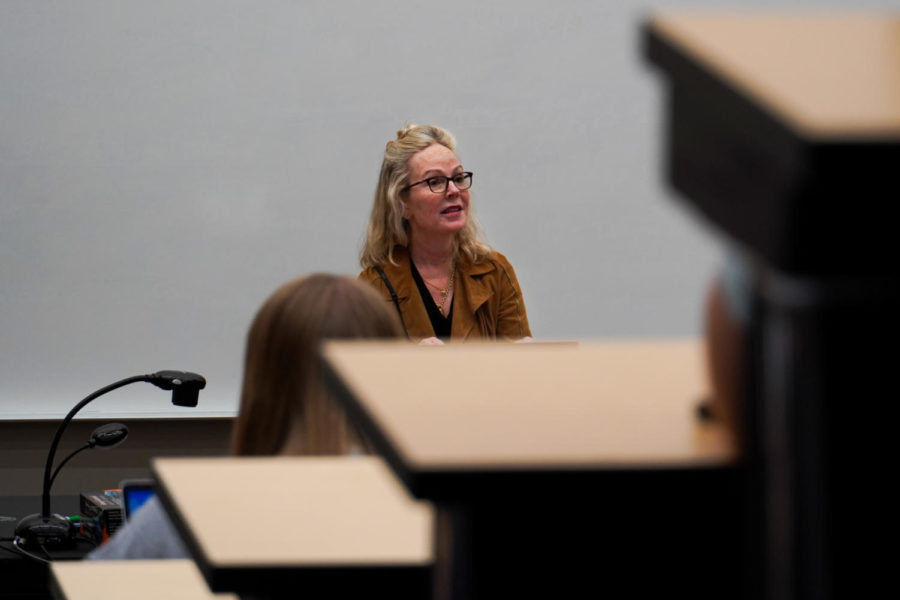Dani Shapiro: Storytelling with secrets
Author Dani Shapiro speaks at the Whitehall Classroom Building on Thursday, Sept. 29, 2022, at the University of Kentucky in Lexington, Kentucky. Photo by Bryce Towle | Staff
October 5, 2022
Author and podcast host Dani Shapiro spoke to UK students, faculty and staff about storytelling and family secrecy on Thursday, Sept. 29. Jeff Rice, department chair for Writing Rhetoric and Digital Studies, welcomed Shapiro to campus.
He said his department wanted to invite Shapiro because of the previous lack of activities after the pandemic. Rice said Shapiro’s discussion topic, “Family Secrets and the Stories We Carry,” would be helpful as the academic year begins.
“Today we welcome the speaker who writes about the human condition, whose guests come and speak about the human condition, and we’re really happy she’s here with us today,” Rice said.
Some students attended for classes with topics similar to those Shapiro discussed. Many were also curious to learn why understanding their own stories mattered.
UK senior Lily Beasley said she wanted to hear about Shapiro’s personal experiences with self defining stories.
“I thought it was interesting, just the concept of the stories that we carry,” Beasley said. “I’m just intrigued to hear more about how she has done that personally.”
Shapiro explained how she became a writer and how her family history affects her process of storytelling.
She told the audience when she was 23 years old, her father passed away in a car crash and her mother was badly injured. She was an only child and her loneliness produced a need for storytelling.
The story she referenced inspired her first memoir. Shapiro’s discovery that the man who had raised her was not her biological father furthered her interest in family secrets.
“The biggest secret of all was me,” she said. “The truth of my identity had been kept from me all my life, and on some level – some unspoken, unthought level – I knew.”
Shapiro began her podcast, “Family Secrets,” because after exposing her secret, others wanted to tell their own. She said she feels protective of her guests while they share vulnerable parts of their lives.
Shapiro also discussed difficulties in creating a podcast. She had no prior experience producing a podcast before making her own. She said it took her years to feel comfortable making episodes of the podcast, and that it takes a team of people many hours to create one episode.
“I felt like a total newbie. I knew a lot about storytelling but not this kind of storytelling. I had to learn a whole new language,” she said.
Shapiro described her writing endeavors about family secrets as her way of attempting to tell stories in differing ways. She said that every risk she has taken in her writing career has served her larger purpose of storytelling.
Shapiro took questions from the audience to close her speech. One audience member asked about the similarities between technical writing and storytelling. Shapiro said that technical writing can still be supported by good storytelling.
“Thinking of it as something that has a shape, thinking of it as something that is storytelling,” she said. “The data tells a story.”
Another audience member asked if it was hard for Shapiro to stay genuine with guests on her podcasts after talking to so many about their secrets. Shapiro credited discovery with her continued passion of storytelling.
“I never ask the same questions,” she said. “Discovery is so much of storytelling and if I were no longer discovering through the process of these interviews for “Family Secrets,” I wouldn’t do it anymore.”
Throughout her talk and while answering questions, Shapiro stressed how important learning how to tell effective stories was to her. She said that being curious about the world and communicating that curiosity well are vital for success.
“To understand the connection, and the picture, and the sense of somebody’s life, you have to be able to understand their story and you have to be able to understand your own in order to be able to make that kind of connection,” she said.
































































































































































